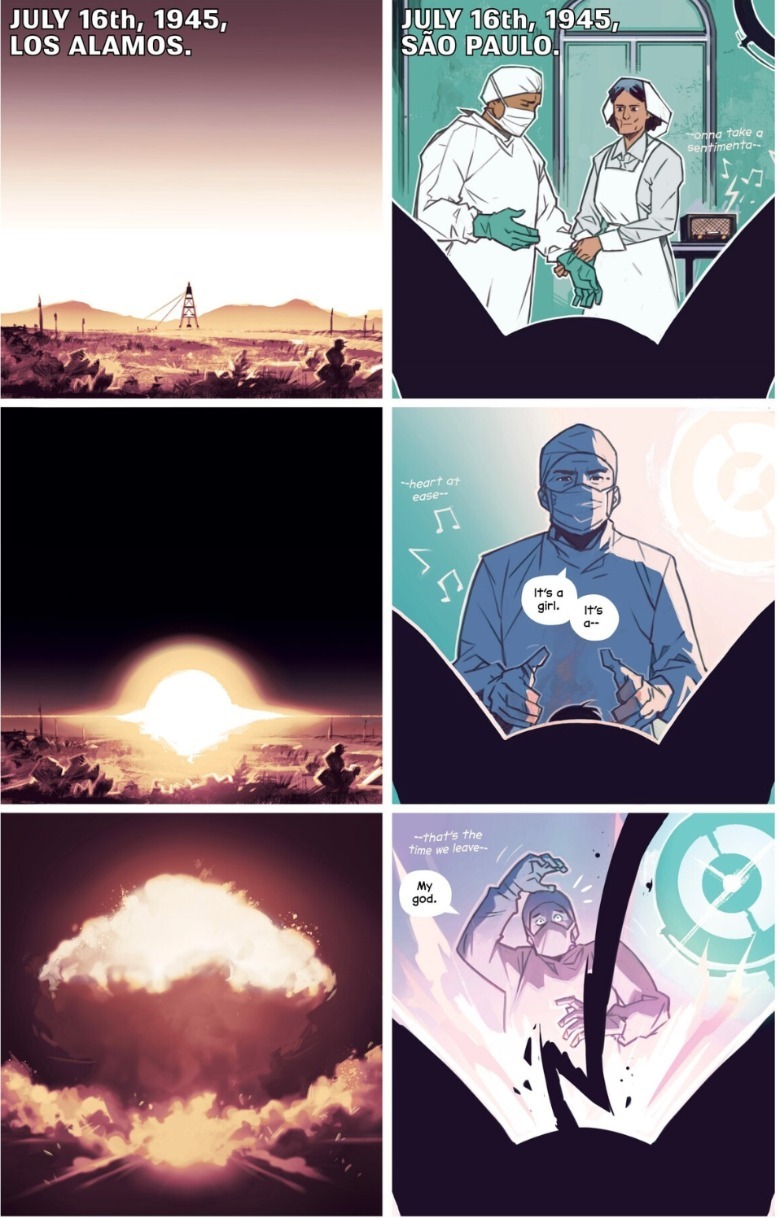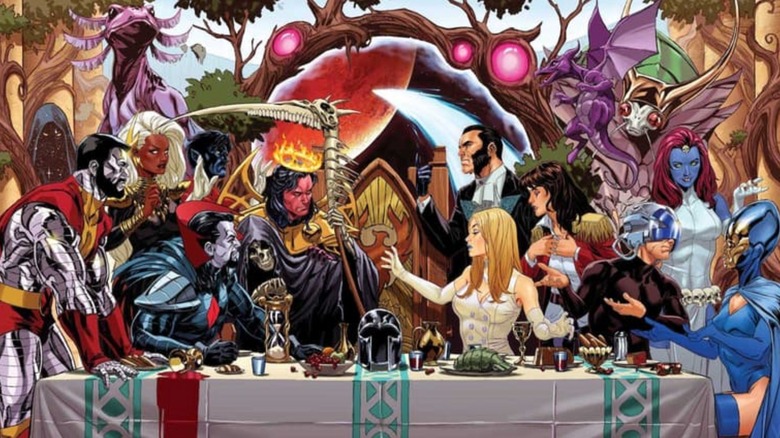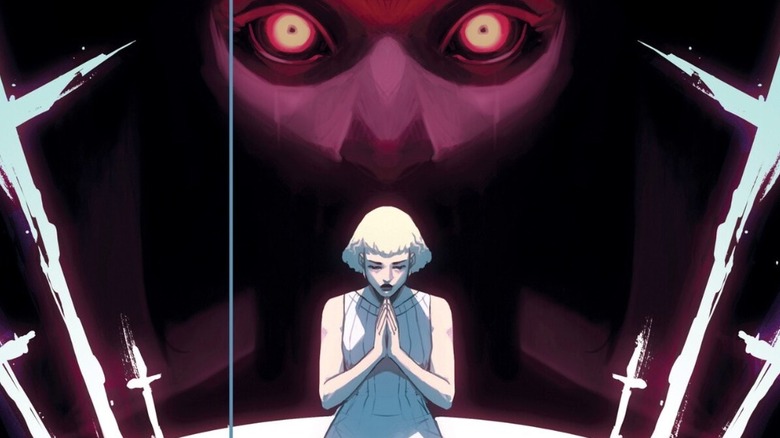This Superhero Comic Is The Best X-Men Story Marvel Never Made
We may receive a commission on purchases made from links.
X-Men fans are in a wait and see period right now. Before Marvel Studios gives the mutants their own reboot, many cast members of the 2000s "X-Men" films are returning for "Avengers: Doomsday" next year. 2026 is also on track to bring us season 2 of the superb animated series "X-Men '97."
The current era of "X-Men" comics, "From the Ashes," is largely replaying old beats; right now, they're doing an "Age of Apocalypse" homage for that comic's 30th anniversary. If "X-Men" fans want a great comic up their alley, then they need to step outside the Marvel Universe.
Enter "The Power Fantasy" by Kieron Gillen and Caspar Wijngaard, for my money one of the best serialized American comics to debut last year. Published by Image Comics, "The Power Fantasy" has published 11 issues/2 volumes ("The Superpowers" and the freshly released "Mutually Reassuring Destruction"). The third arc is set to begin this October with issue #12.
"The Power Fantasy" is set in an alternate 1999. In 1945, superpowered beings called Atomics began to appear across the world. This book focuses on six of them whose power can destroy the world with as much force as a nuclear arsenal (hence, "superpower," a description reserved for nation-states):
-
Etienne Lux, a telepathic utilitarian.
-
Santa Valentina, an angel incarnate who wants to save the world.
-
Brother Ray "Heavy" Harris, a revolutionary who leads a commune for Atomics and can control gravity.
-
Morishita "Deconstructa" Masumi, an artist who summons a rampaging kaiju when she gets upset.
-
Eliza Hellbound, a Catholic girl bonded to the essence of Hell.
-
Jacky Magus, a masked "magician" and leader of the Pyramid cult, whose Atomic power gives him an endless well of intuitive knowledge.
The Cold War allusions of the comic suggest "Watchmen." Alan Moore is the original "superheroes in reality would be horribly destructive time bombs" writer with his work on "Watchmen" and "Miracleman." "The Power Fantasy" issue #3 opens with a six-panel grid; one column shows the Trinity atomic test exploding in 1945. The next one over shows Valentina's birth, or the beginning of the Atomic age. In "Watchmen," Dr. Manhattan is a nuclear physicist reborn with power like the bomb.
In his notes for "The Power Fantasy" #6, Gillen said one way he pitched the book was: "'Watchmen' if there were six Doctor Manhattans" but I always immediately follow that up with 'imagine if you and your five messiest mates had to stay civil or the world would end.' Because, as you say, these are mainly very human people and a comparison to the detached Dr. Manhattan is misleading."
That sort of messy, soapy character drama is where the X-Men live and breathe. Gillen would know; he's written "X-Men" comics before and "The Power Fantasy" is taking ideas he'd had for the X-Men into a universe that can hold them in a way the Marvel Universe never could.
How Kieron Gillen went from Immortal X-Men to The Power Fantasy
Gillen wrote "Uncanny X-Men" from 2011 to 2012, then in 2022, he joined the X-Men's "Krakoa era" with his book "Immortal X-Men." "Immortal X-Men" #10 is narrated by Professor Charles Xavier; it's my favorite of the run and in it, I see the genesis of "The Power Fantasy."
Professor X is a good but practical man, one who dreams of a better world but knows dreams hardly ever come true. Why did he choose a superhero team as the vehicle for his social justice cause? Because, as Charles observes, mutants are different from other oppressed minority groups: "We are dangerous." If the telepathic Xavier wanted to, he could make the entire world his puppets, and sometimes he thinks him not doing so makes him complicit in suffering. His one, private indulgence is that he's brainwashed world leaders to ensure they never start a nuclear war. Yet that is an invisible, unprovable display of Xavier's power. It also acts to keep the world as is, because the Marvel Universe has to reflect the real world.
"The Power Fantasy" works from the same ideas in "Immortal X-Men" #10 about how any person with superpowers has capacity to cause horrible destruction; they're WMDs but with the foibles of ordinary people. On the very first page of "The Power Fantasy," Lux tells Valentina the "ethical" thing is for them to rule the world; Lux embraces the temptation Xavier fought off. He is an ethical man, but not a good one. (The same way Eliza says about how God forgiving even the worst sinners makes him all good, but not all just.)
Lux and Valentina settle on a precarious "balance" instead, a balance that the narrative of "The Power Fantasy" rests on. The lingering influence of "X-Men" on Gillen comes through most in Lux and Heavy, who are blatantly Professor X and Magneto. One is a powerful telepath who wants to save the world as is, the other can move objects with his mind and wants to build a new world for his people. The personalities differ, granted. Xavier is warm and an idealist, Lux is neither. Heavy is a joint-smoking hippie, Magneto talks like a Shakespeare character. The similarities come down to superpower and ideology.
Accumulating X-Men fans, the conflict of issue #1 is between Lux and Heavy. The U.S. government tries to assassinate Heavy with a satellite laser... and fails. To quell him, Lux telepathically kills the President and his top advisors. Right there, before issue #1 ends, is something Professor X (or any Marvel superhero) would or could never do.
The X-Men overlap doesn't end there. In "The Power Fantasy," Atomics are called "The Nuclear Family," a clear pun that also evokes a common name for mutants: Children of the Atom. Heavy and his Atomic followers live in the floating city Haven, a la Magneto's orbital mutant refuge Asteroid M. The last major Superpower conflict was in 1989, "the Second Summer of Love," when Hell opened up underneath England — can you say it was an "Inferno"?
The Power Fantasy asks if a superhero comic can have no fight scenes
Superhero comics are all about beings with extraordinary powers and colorful costumes fighting each other. "The Power Fantasy" removes the fighting. If the Superpowers fight, the world ends. It's why Gillen has sometimes written in the issue back pages he's hesitant to even call it a superhero book. (Though its central theme, as Gillen notes in his issue #8 notes, is "with great power comes great responsibility.")
The comic's title is layered with different meanings, one being a pointed question. Don't most people enjoy superhero comics for power fantasy? Doesn't this premise that restricts that sound counterintuitive? It's not, because it replaces it with ticking time bomb tension. Masumi shows this, and her character is a great premise within a premise.
Even her girlfriend Isabella has to walk on eggshells around her, but Masumi doesn't want to hurt people. She knows and understands why people hate her. This only makes her feel worse about herself and more likely to summon a death monster.
I admittedly often speed read comics, my eyes shooting from one panel to the next. "The Power Fantasy" demands that you linger on every panel to understand the web this book is weaving. Wijngaard's lovely art makes it easy to keep looking. He gives scenes set in different years a style that reflects the mood of that year; for instance, in issue #5, scenes set in England during the 1970s look like they were drawn on peeling, graffiti-ed wallpaper. That sort of coding only comes through if you take your time to read.
"The Power Fantasy," by focusing on a world-shaking cabal of superpowered beings, invites not just comparisons to "X-Men" but to another of Gillen's comics: "The Wicked + The Divine" (drawn by Jamie McKelvie). There, a pantheon of 12 gods reincarnates every 90 years, living as famed artists. "The Wicked + The Divine" makes gods into musicians to explore how we worship artists we love, and sometimes treat the beautiful art they make as beyond the craft of "normal" people. Fandom is the new religion, but at the end of "The Wicked + The Divine," the Pantheon decides maybe they weren't deities after all.
In "The Power Fantasy," no one is backing down like that. No specifics, but the ending of the second volume sees a first strike and a sign that this superhero cold war might turn hot. Will it be hot enough to cook the world? If this were an "X-Men" comic, the answer would inevitably be no. But it isn't, so the answer is not foregone. I'll keep reading "The Power Fantasy" to find out if that "maybe" becomes "yes" or "no."
"The Power Fantasy" is currently available for physical and digital purchase; "The Power Fantasy" issue #12 is set for release on Wednesday, October 8, 2025.



